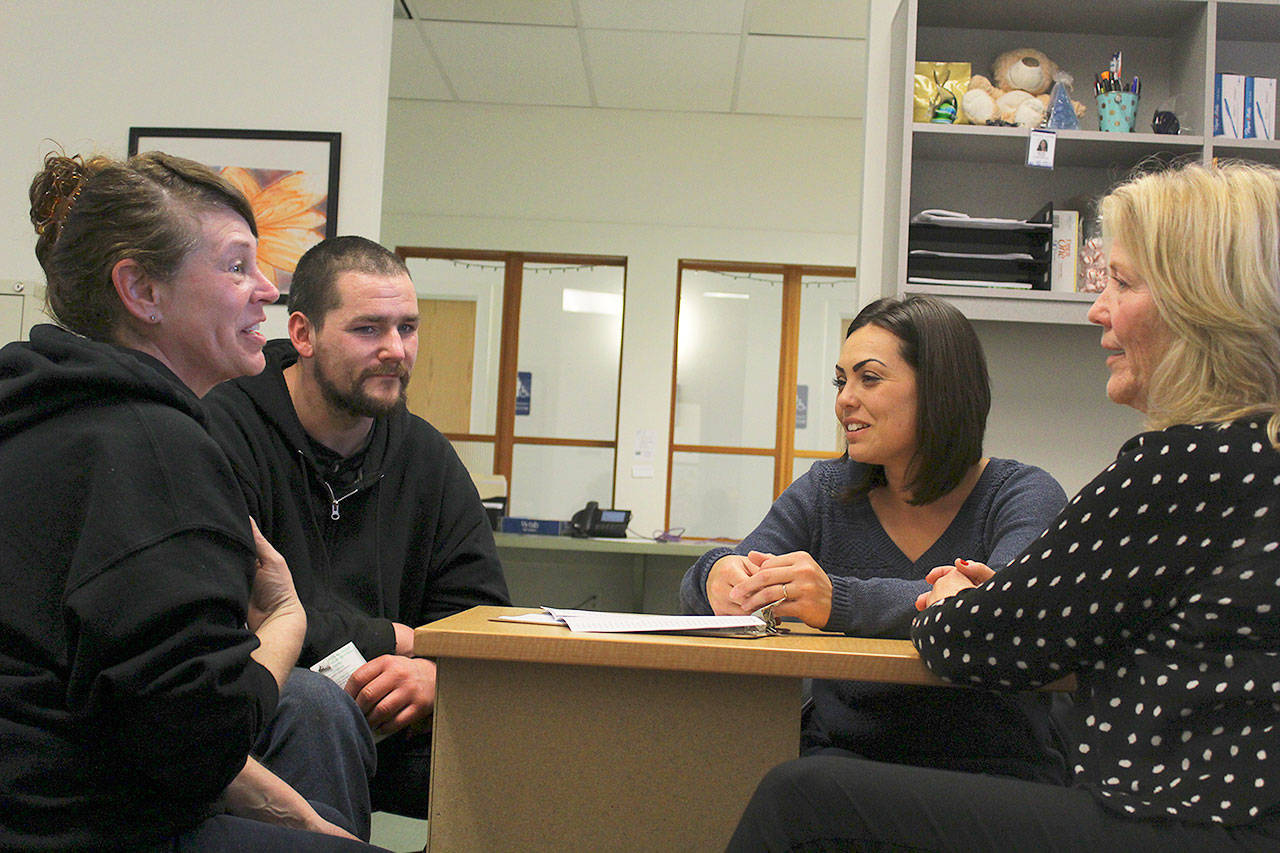Ecstatic. That’s how Carla Farnell felt.
After spending a dark, wet winter without a bed or place to cook or bathe, things were looking up. A job, an income, a roof over her head. All of it was finally coming true. Farnell and her boyfriend, Shawn Lowe, were moving into an Oak Harbor apartment complex with assistance from Island County Housing Support Center.
While the paperwork cleared, she worked her new job cleaning motel rooms.
“I worked for five days and got fired on Valentine’s Day,” said Farnell, 50. “I got fired because they found out I was homeless. I had given a bogus home address on my application.”
Because she lost her job, the apartment manager told her she no longer qualified for a unit. But she couldn’t keep her job without a permanent address.
“Every time you get a leg up, they move the wall,” said Farnell, who’s worked in the past as a caretaker for families.
“It’s hard to keep your pride and your dignity.”
Farnell’s catch-22 situation is just one of many quandaries faced by the homeless and their advocates, said Housing Resource Coordinator Joanne Pelant at an Island County Commissioners work session last week. The new county housing program started in August with a mission of assisting the homeless, preventing homelessness and helping low-income residents find housing. It works with property managers, transitional housing services, churches and motels.
With various federal, state and county funding, the center is able to assist residents financially by paying rental application fees, security deposits, initial rent and short motel stays. Those receiving financial aid must be homeless or in the process of being evicted or having their leases terminated.
Rising rents are leading to more evictions and broken leases and more individuals and families needing help, human services housing specialists told county commissioners last week at a work session.
In particular, the number of older single people facing homelessness is rising dramatically, according to data collected from January’s Point in Time one-day count of the homeless.
The number of unsheltered single adults rose 49 percent from 2016 to 2017.
“Generally, we have a low inventory of studios and one bedroom apartments,” Pelant said.
January’s Point in Time count totaled 209 people, down from the previous year’s count of 222 people. The decrease could be explained by fewer volunteers spread out across Whidbey and Camano Islands on the day of the count, Pelant said.
Of the 209, 154 were considered “unsheltered,” meaning they’re living in vehicles, tents, abandoned buildings or elsewhere outdoors, while 55 were termed “sheltered” and living in emergency or transitional housing.
“We saw virtually no change from 2016 to 2017 in terms of unsheltered people,” Pelant said.
Nearly half of the unsheltered people interviewed for the Point in Time count said they lived outdoors. The count showed a 62 percent increase in chronically homeless people over a four-year period from 2014 to 2017.
“It’s anecdotal, it’s not science,” Pelant said of the Point in Time count, which is meant to be a snapshot. “But it begins to tell us trends. People lose their housing, move into their vehicles, something happens to their vehicles, they end up outdoors.”
Some relief is on the way.
Oak Harbor’s first emergency shelter called The Haven opens Thursday evening at Christian Reformed Church, 1411 Wieldraayer Road, near Swantown Road. It will be open every night for men, women and families.
Until a permanent site is found for The Haven, the Whidbey Homeless Coalition plans to operate the shelter out of church fellowship halls on a rotating basis, using a two-person paid staff and a legion of volunteers.
Spin Cafe, located downtown at 658 S.E. Bayshore Drive, will serve as a Haven check-in center.
The Whidbey Homeless Coalition and Spin Cafe are two of many programs that refer people to the Housing Support Center. Of 802 individuals seeking help at the coalition’s Coupeville office since Aug. 8, 130 had no shelter, 166 faced imminent homelessness, 78 lived with families or friends and 26 were stably housed.
Overall, 42 percent found housing. For the rest who didn’t, they remain on long waiting lists for subsidized housing or for openings in the county’s numerous transitional housing programs.
“… our need is much greater than the capacity we have,” Pelant told the Island County Commissioners.
Farnell and her boyfriend, who is disabled and receives $735 in monthly social security benefits, may still get in the Oak Harbor apartment. As soon as housing navigator Malissa Taylor heard Farnell got fired because she lacked a home, she convinced the apartment manager to hold the apartment while she applied for a new source of funding called a “home consortium voucher.”
It’s available to help with long-term rental assistance for those with limited means but potential to earn.
“There are people like Carla who really want to work and hit bad luck, and with assistance they will be able to get back on their feet,” Pelant said.



